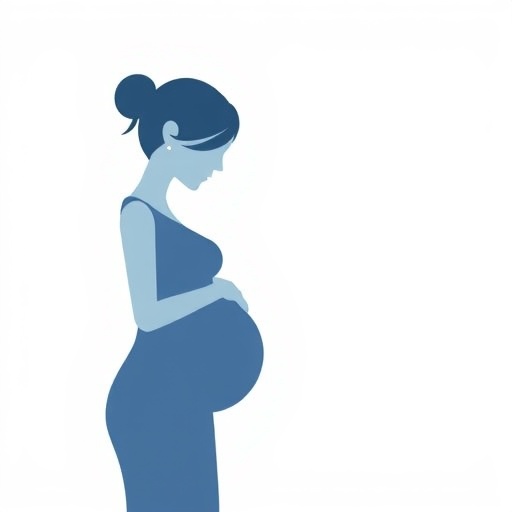In a landmark meta-analysis published in BMC Psychology, researchers Liu, Zhao, Zhuan, and their colleagues have brought forward compelling evidence that substantiates the association between depression and increased risks of spontaneous abortion. This comprehensive investigation, set to be a cornerstone in both psychiatric and obstetric research, unravels the complex interplay of mental health and reproductive outcomes, shedding light on an often-overlooked dimension of pregnancy risk factors.
Depression, a multifaceted psychiatric disorder, has long been recognized for its profound impact on quality of life and overall health. Yet, its implications during pregnancy have remained elusive, particularly in terms of quantifiable effects on miscarriage incidence. This meta-analysis synthesizes data from numerous studies worldwide, employing robust statistical models to delineate the relationship between depressive symptoms and spontaneous abortion, offering new insights for clinicians, researchers, and public health policymakers.
The magnitude of their findings is significant. The pooled analysis reveals that women diagnosed with clinical depression or presenting notable depressive symptoms before or during early pregnancy exhibit a statistically higher risk of experiencing spontaneous abortion compared to non-depressed counterparts. Such findings underscore depression not merely as a psychological burden but as a concrete biological risk factor influencing pregnancy success.
Underlying biological mechanisms contributing to this association are multi-layered. Chronic depression is known to induce dysregulation of the hypothalamic-pituitary-adrenal (HPA) axis, generating sustained elevations in cortisol levels. Elevated cortisol, in turn, adversely affects immune function and placental development, potentially disrupting the maternal-fetal interface critical for embryo implantation and growth. These endocrine perturbations offer a plausible pathophysiological route linking depression to pregnancy loss.
Further, inflammatory pathways are increasingly recognized as pivotal in pregnancy maintenance. Depression’s propensity to induce systemic inflammation, characterized by increased pro-inflammatory cytokines such as interleukin-6 (IL-6) and tumor necrosis factor-alpha (TNF-α), may provoke an inhospitable uterine environment. This inflammatory milieu could compromise trophoblast invasion and vascular remodeling, processes essential for pregnancy continuation, thereby heightening miscarriage risk.
The meta-analysis also explores confounding factors meticulously. Variables such as maternal age, socioeconomic status, smoking, and concurrent medical conditions were controlled across included studies to isolate depression’s independent effect. This rigorous approach buttresses the credibility of results, suggesting that depression’s contribution to miscarriage risk is not merely correlative but potentially causal.
Another compelling aspect of this study is its emphasis on temporal dynamics. It highlights that depression both prior to conception and during the critical first trimester markedly elevates spontaneous abortion likelihood. This timeframe corresponds with early embryonic and placental development stages, indicating that psychological health well before pregnancy recognition can influence outcomes. These findings advocate for preconception mental health screening as a strategic intervention point.
Clinical implications stemming from this research are vast. It signals an urgent need for integrated obstetric and psychiatric care models aimed at early identification and management of depression in women planning pregnancy or in early gestation. Initiatives like routine depression screenings, psychosocial support, and pharmacotherapy when indicated could mitigate fetal risks linked to maternal mood disorders, heralding a paradigm shift in prenatal care.
Moreover, this research invites a reevaluation of current obstetric guidelines. Despite the prevalence of depression among childbearing women, mental health is frequently sidelined in prenatal risk assessments. This meta-analysis compellingly argues for the inclusion of depression as a significant pregnancy risk factor, warranting interdisciplinary vigilance and policy reforms to incorporate mental health metrics in maternal risk evaluations.
The intersection between mental health and reproductive biology unveiled by Liu and colleagues also proffers fertile grounds for future research. Investigations probing molecular signatures of depression-induced pregnancy loss, the impact of antidepressant use on miscarriage rates, and the efficacy of behavioral interventions in reducing miscarriage risk will be pivotal in translating epidemiological insights into tangible clinical benefits.
In addition to biochemical mechanisms, psychosocial dimensions deserve attention. The chronic stress, social isolation, and diminished self-care accompanying depression could indirectly promote pregnancy complications, including miscarriage. Identifying the relative contributions of biological versus psychosocial pathways is crucial for tailoring effective prevention and treatment strategies.
Furthermore, cultural and geographic variations documented in the studies compiled reveal disparities in depression prevalence and miscarriage rates globally. Understanding how sociocultural determinants modulate this relationship can guide the customization of maternal mental health programs, ensuring cultural competence and improved outreach efficacy.
The authors also acknowledge limitations inherent to meta-analytic methods, such as heterogeneity of diagnostic criteria for depression, variability in miscarriage definitions, and potential publication bias. These caveats highlight the complexity of merging data across diverse study designs but do not detract from the overarching conclusion regarding depression’s influence on pregnancy loss.
Importantly, this study elevates awareness that maintaining mental health is an indispensable facet of reproductive wellness. It calls for a holistic approach to maternal care, wherein emotional well-being is afforded as much attention as physical health markers. Such integrative care models promise to enhance pregnancy outcomes and long-term maternal-child health trajectories.
In summary, this pioneering meta-analysis delivers irrefutable evidence linking depression to heightened spontaneous abortion risk, illuminating previously underappreciated risk pathways. By integrating psychiatric evaluation into prenatal frameworks, healthcare systems can better safeguard pregnancy viability and foster healthier generations. The scientific community eagerly anticipates the diffusion of these findings into clinical practice and continued exploration of this critical nexus between mind and reproduction.
Subject of Research: The relationship between depression and risks of spontaneous abortion (miscarriage).
Article Title: Depression with risks for spontaneous abortion: a meta-analysis.
Article References:
Liu, J., Zhao, M., Zhuan, J. et al. Depression with risks for spontaneous abortion: a meta-analysis. BMC Psychol 13, 1148 (2025). https://doi.org/10.1186/s40359-025-03484-4
Image Credits: AI Generated




